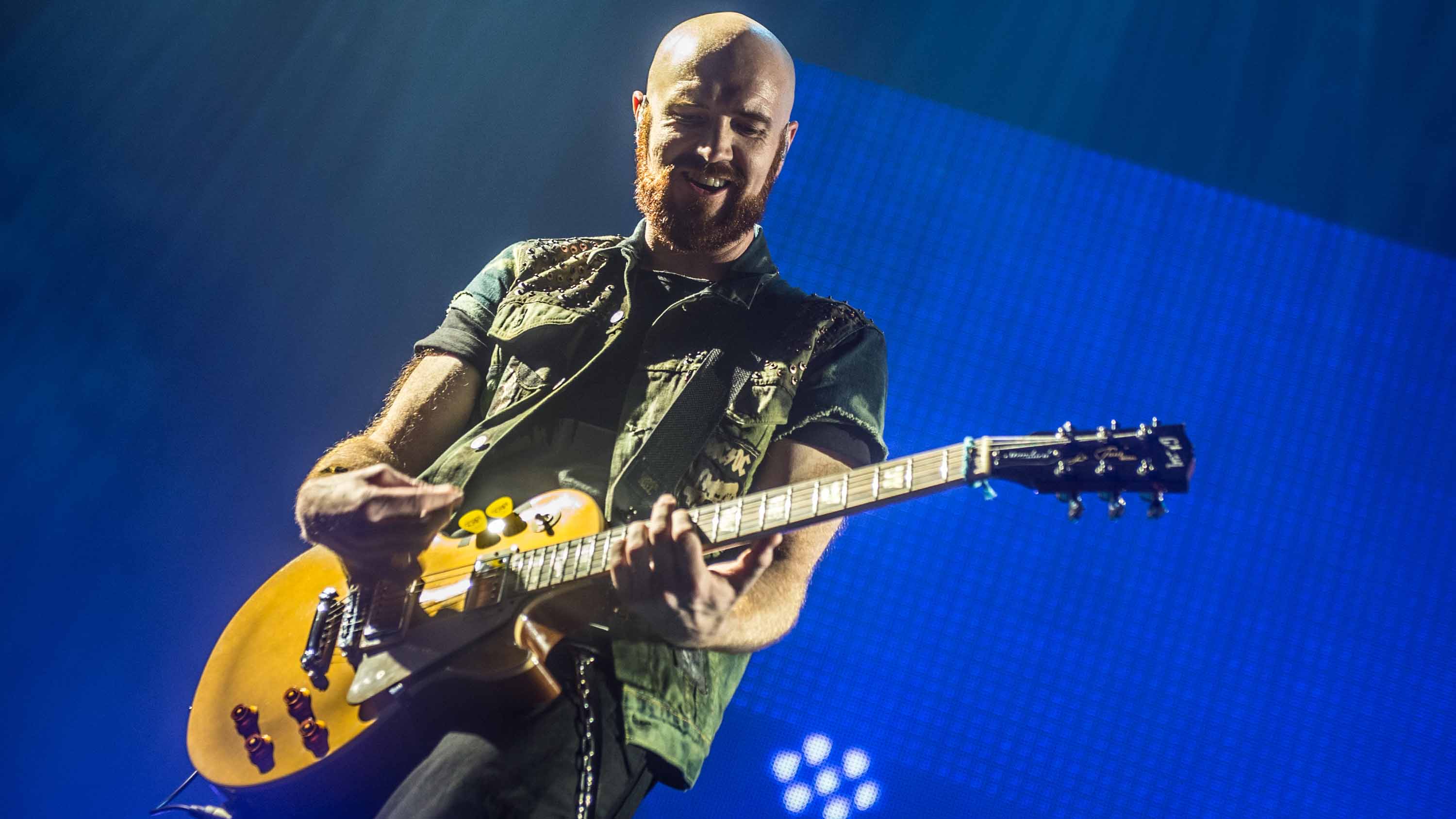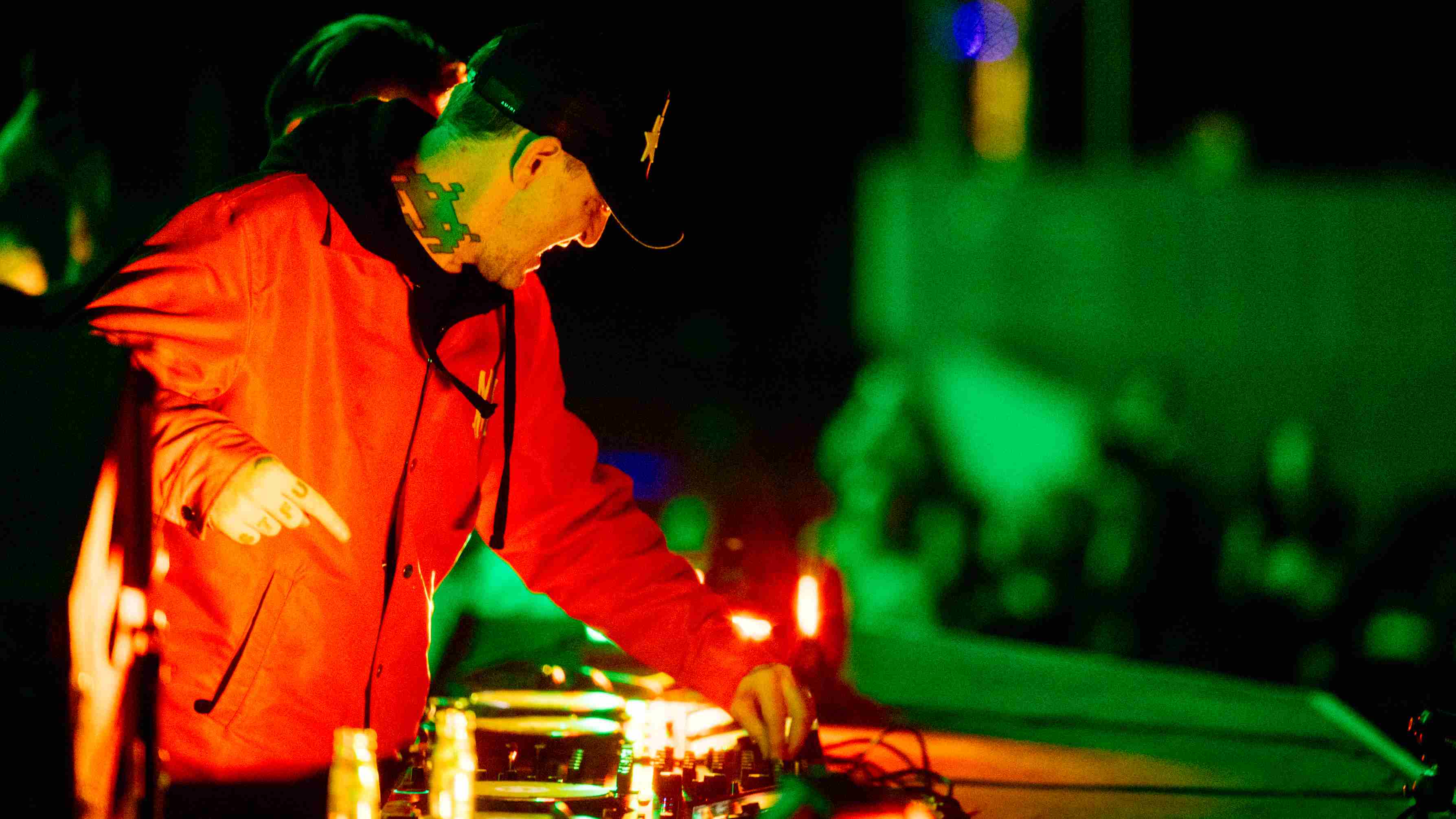10 questions for The Script’s Mark Sheehan
Guitar tips, essential gear and festival mishaps

Danny O'Donoghue may be the face of The Script, but behind every song is powerhouse songwriter and guitarist Mark Sheehan, whose knack for anthemic choruses and tasty tones fuels the band’s long line of chart-topping singles and albums.
As the Irish trio release the video for Arms Open - a collaboration with charity A Sense Of Home - and ready themselves for a mammoth UK arena tour, we sat down with Mark to get the lowdown on his journey in guitar gear, playing background and one particularly painful onstage incident…
1. What was your first guitar and when did you get it?
“My first guitar I bought in the UK - I bought it in Sheffield of all places! It was a Taylor 514 acoustic.”
2. The building’s burning down - what one guitar do you save?
“I would save - and this will probably annoy some people! - my Goldtop Les Paul. It’s a standard guitar, it’s got standard pickups, it’s all very standard but it’s just a very well-balanced guitar that works across the board for everyone.”
3. What's the one effects pedal you couldn't do without, and why?
Get the MusicRadar Newsletter
Want all the hottest music and gear news, reviews, deals, features and more, direct to your inbox? Sign up here.
“Well, effects pedals to me nowadays can be a little bit redundant, although for playing live of course, live effects pedals are always useful. I’ve gravitated towards the Kemper Profiler, which has basically eradicated me having to use my head amps and I can now carry this machine around, which profiles all the other effects pedals. I get to have all those effects in one little box - it’s very useful and it’s very good for touring.”
My Taylor 514 was stolen… it was devastating and everyone knows that was my guitar - it’s like my Harry Potter wand
4. Is there a guitar, or piece of gear, that you regret letting go?
“I was moving studio two years ago and my very first guitar that I mentioned above - my Taylor 514 - was stolen in the move. I’d had that guitar for over 20 years, and we checked everywhere. It was devastating and everyone knows that was my guitar - it’s like my Harry Potter wand. I had written so many songs on that guitar - it's on so many of The Script's hit songs.
“Danny has the sister guitar to it - we bought those at the same time when we were younger - and he still has his, which kills me. I’m convinced he robbed mine… he’s the culprit!”
5. And what's the next piece of gear you’d like to acquire?
“I’m trying to remember the name of it right now… It’s basically this thing which is an audio piece that sits between your computer, it makes recording very easy when you are on the road.
“I’m always looking for something that is a dab hand at quickly getting song ideas down because when you work in audio world you can get bogged down by the technical aspect, and I find that hinders your songwriting. So I think that streamlined songwriting is always better, and this new piece of gear that’s about to be launched I’m looking forward to using.”
6. What’s your favourite chord, and why?
“I think a C chord, because it can be melancholic, and whatever scale it sits in it tends to be the one chord that is the route of everything often. Within modern music there’s probably been more hit songs written in C than there has been in any other chord.”
7. Is there an aspect of guitar playing that you'd like to be better at?
“When you talk about a lot of guitar players in the UK and Ireland, they tend to be rock and alternative-based, so they do a lot of riffs and runs and things like that, whereas I’ve ignored that pretty much all my life as I grew up on Stevie Wonder, James Brown, and rhythm and blues and things like that. So for me I think I’d like to get better at riffs and runs just for the sake of learning something new.”
I don’t like seeing guitar players looking at their boots - that’s very boring. You should remember you’re putting on a show as much as you are playing
8. If you could have a guitar lesson from one guitarist, dead or alive, who would it be, and why?
“Bob Marley - you only have to listen to him to know why.”
9. What’s the worst thing that’s ever happened to you onstage?
“At the Isle of Wight festival! I learned when I was playing guitar that I could get myself a tiny little amp, a really small amp that would be hooked onto a guitar strap, so I could wrap it round my body, I could sit on my arse and I could play my guitar and walk when I played. I believe that you should be able to walk and play when you are on stage and you shouldn’t have to look at your instrument.
“I quite like having a bit of movement; I don’t like seeing guitar players looking at their boots - that’s very boring. You should remember you’re putting on a show as much as you are playing. Of course, I’ve become very good at this: I can move, I can jump, I’ve learned to really move when I’m playing my guitar.
“My worst moment must have been at the Isle of Wight festival… I usually see Danny run from one side of the stage - because it’s massive; it’s about 70,000 people - and I see Danny run across one side of the stage, so I decide to balance the stage out a bit for a show perspective, so I go the other side of the stage. I was doing that and I saw him coming, so I run across the stage and right live on television I’m running and I hit a big joint cable and I tumbled… and it’s an epic fall.
“I was running so fast - must have been the adrenaline - and I hit a f***ing cable, and I rolled. I split my eye open, a guitar cracked me in the face but I somehow, I kept going and didn’t miss a chord. I don’t know how I did it, but when I watched back, I rolled back up onto my feet and I just kept playing.”
10. What advice would you give your younger self about playing the guitar?
Be able to sing everything you can play, because A) it improves your vocals and B) it’s always good in a band to have a guitarist to do vocals
“Don’t be so erratic, don’t try to fill every piece of silence with a sound. Chill out, remember that the silence is as important as the sound and gives the space between notes time to breathe.
“And don’t overcomplicate everything, because often young players tend to get too busy; you’re full of energy and you just want to show off what you can do, when the older and wiser guitarists that I meet have all simplified their music. They don’t often play big full chords any more; they play simpler versions of chords.
“And the one other thing is to be able to sing everything you can play, because A) it improves your vocals and B) it’s always good in a band to have a guitarist to do vocals. So always sing all the parts you can play.”
Mike is Editor-in-Chief of GuitarWorld.com, in addition to being an offset fiend and recovering pedal addict. He has a master's degree in journalism, and has spent the past decade writing and editing for guitar publications including MusicRadar, Total Guitar and Guitarist, as well as a decade-and-a-half performing in bands of variable genre (and quality). In his free time, you'll find him making progressive instrumental rock under the nom de plume Maebe.
“It is ingrained with my artwork, an art piece that I had done years ago called Sunburst”: Serj Tankian and the Gibson Custom Shop team up for limited edition signature Foundations Les Paul Modern
“The last thing Billy and I wanted to do was retread and say, ‘Hey, let’s do another Rebel Yell.’ We’ve already done that”: Guitar hero Steve Stevens lifts the lid on the new Billy Idol album










